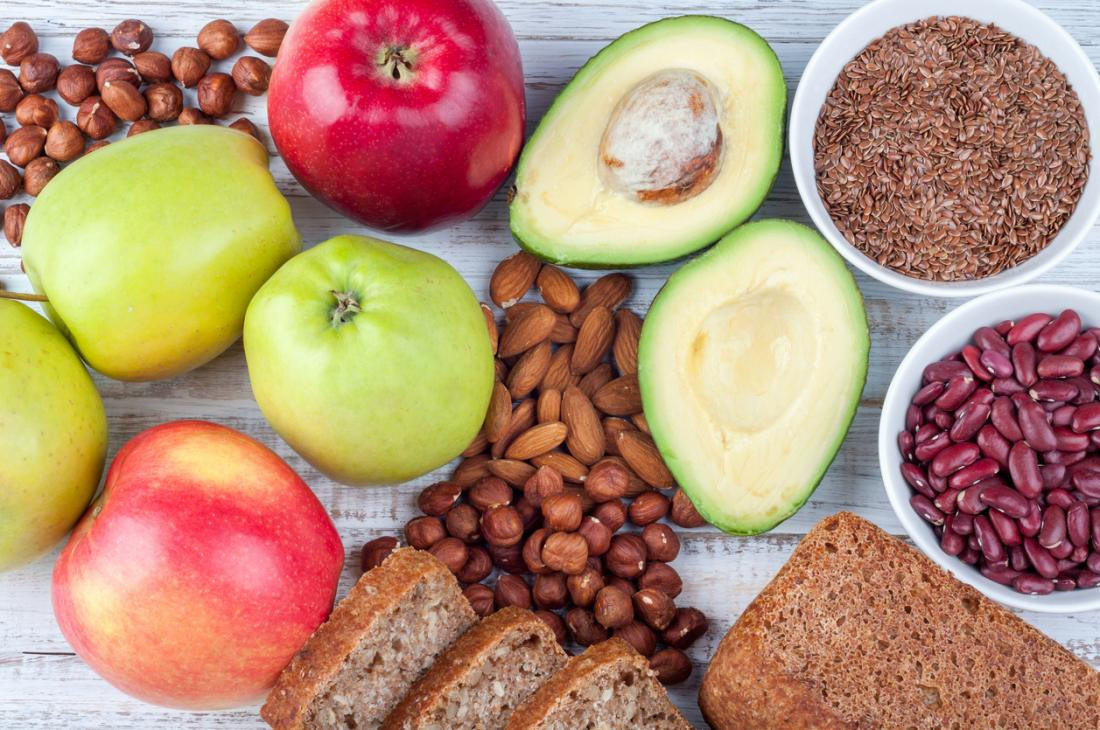Digestion is a complex process that breaks down food into nutrients your body can absorb. Understanding how long different foods take to digest can be beneficial for optimizing your digestive health and overall well-being. While there isn’t a one-size-fits-all answer, as digestion time varies from person to person and depends on various factors, we can explore general guidelines and factors influencing this process.
One crucial aspect affecting digestion time is the composition of your diet. Foods rich in fiber, for example, play a vital role in healthy digestion.
 Optimize your digestion time with fiber-rich plant foods: a visual guide to fruits, vegetables, legumes, nuts, and seeds that aid in efficient food digestion and gut health.
Optimize your digestion time with fiber-rich plant foods: a visual guide to fruits, vegetables, legumes, nuts, and seeds that aid in efficient food digestion and gut health.
Fiber, abundant in fruits, vegetables, legumes, and whole grains, adds bulk to your stool and helps move food through your digestive system more efficiently. This not only aids in preventing constipation but also supports a healthy gut microbiome and can contribute to weight management. These plant-based foods are generally digested relatively quickly compared to other food types.
In contrast, foods high in fat, particularly processed and fast foods, tend to take longer to digest. Fat digestion requires more work from your digestive system and can slow down the overall process. Red meat, being high in fat and protein, is also known to be more difficult to digest and may remain in your digestive system for a longer duration. Furthermore, processed foods often contain additives and can disrupt the balance of gut bacteria, potentially leading to digestive discomfort and impacting digestion time.
Staying adequately hydrated is another key factor in optimizing digestion time. Water and other fluids like herbal teas and juices help soften stool and facilitate the smooth passage of food through the digestive tract. Dehydration can contribute to constipation and sluggish digestion, increasing the time food takes to move through your system.
Probiotics, beneficial bacteria found in fermented foods like yogurt, kefir, sauerkraut, and kimchi, can also influence digestion time. These probiotics help maintain a healthy balance of gut bacteria, which is crucial for efficient digestion and nutrient absorption. A balanced gut microbiome supports the breakdown of food and can contribute to regular bowel movements, impacting the overall time food spends in your digestive system.
Regular physical activity is not just beneficial for overall health; it also plays a role in digestion. Exercise, even a gentle walk after meals, can stimulate the digestive system and help reduce bloating, gas, and constipation. Movement encourages the muscles of the digestive tract to contract and move food along, potentially reducing digestion time.
Stress management is another often-overlooked aspect of digestive health. Stress can negatively impact digestion by slowing down the process and contributing to symptoms like heartburn, cramping, and bloating. Techniques like meditation, deep breathing exercises, and yoga can help manage stress levels and promote more efficient digestion. Even simple deep breaths before eating can prepare your body for digestion.
Dental hygiene is also surprisingly relevant to digestion time. The digestive process begins in the mouth with chewing. Proper chewing breaks down food into smaller particles, making it easier for digestive enzymes to work. Dental issues that hinder chewing can impair this initial step and potentially affect the overall digestion time.
Digestive enzymes play a crucial role in breaking down food components. While your body naturally produces digestive enzymes, some individuals with conditions like low stomach acid, chronic stress, or digestive diseases might benefit from enzyme supplements. These supplements can aid in the breakdown of food and potentially improve digestion efficiency, but it’s always advisable to consult a doctor before starting enzyme supplementation.
Finally, it’s important to recognize that underlying digestive conditions can significantly impact digestion time. If you experience persistent digestive issues, it’s crucial to consult a healthcare professional to manage symptoms and address any underlying medical conditions that might be affecting your digestive health and the time it takes for your body to digest food.

